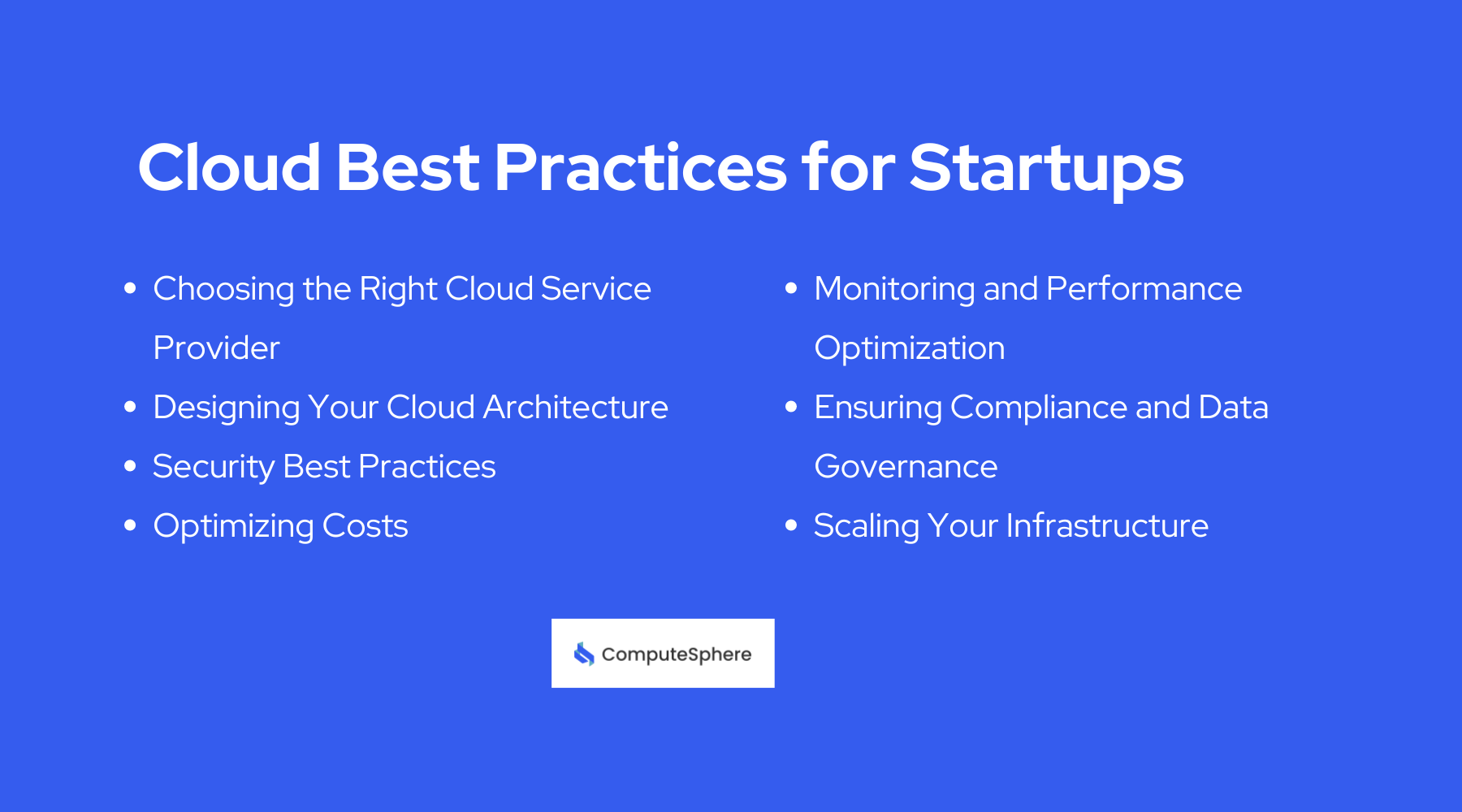Cloud Infrastructure Best Practices for Your Startups

Startups are increasingly changing cloud infrastructure to fuel their growth and innovation. Cloud infrastructure provides scalability, security, and cost-efficiency, essential for businesses seeking agility and competitiveness in dynamic markets.
However, effectively managing the complexities of cloud infrastructure requires careful planning and application of best practices suited to your startup's specific needs. From selecting the right service providers to optimizing resource allocation, strategic deployment of cloud solutions can empower startups to scale efficiently and drive sustainable success.
Let's look at important practices for setting up cloud infrastructure for your startups.
Cloud Best Practices for Startups

Choosing the Right Cloud Service Provider
The foundation of a successful cloud infrastructure begins with selecting the right service provider. There are many choices available, from big companies like AWS, Google Cloud, and Microsoft Azure to smaller ones that specialize in specific solutions. Choosing wisely can affect how well your startup runs and grows over time.
The performance and reliability are very important to consider. Checking how often the service is available, service-level agreements (SLAs), and how widely they operate around the world can help make sure the service works well.
Moreover, scalability is another important factor, particularly for startups ready for rapid growth. A cloud provider offering flexible scaling options, such as auto-scaling capabilities and a variety of instance types. It enables startups to adjust resource allocation to meet evolving demands without unnecessary costs.
Designing Your Cloud Architecture
Choosing a cloud service provider is just the beginning; it's crucial to design a strong cloud architecture that fits your startup's needs. Cloud computing offers three main models: Infrastructure as a Service (IaaS), Platform as a Service (PaaS), and Software as a Service (SaaS), each addressing different operational requirements and scalability goals.
For startups that value control and customization, IaaS is ideal. It allows you to outsource hardware and infrastructure management while maintaining control over operating systems, applications, and data. PaaS, on the other hand, simplifies development and deployment with pre-configured environments and middleware, speeding up time-to-market for new products. SaaS provides ready-to-use business applications, freeing startups from software maintenance and updates so they can focus on core activities
Additionally, to ensure scalability, high availability, and durability, adjust your cloud architecture accordingly. Implement backup systems across multiple data centers, utilize load-balancing technology, and automate backup and recovery processes. These steps are essential for maintaining operations and customer satisfaction during growth and unexpected disruptions.
Security Best Practices
Security remains a top concern for startups using cloud infrastructure. It gives the potential risks of data breaches, cyber-attacks, and compliance violations. Therefore, implementing strong security measures is essential to protect sensitive information, maintain customer trust, and meet regulatory requirements.
Effective identity and access management (IAM) practices are crucial for controlling user access permissions. It reduces the risk of unauthorized data exposure or system compromises. Using multi-factor authentication (MFA), role-based access controls (RBAC), and least privilege principles ensures that only authorized personnel can access critical resources and sensitive data.
Additionally, regular security audits, vulnerability assessments, and penetration testing are proactive steps to identify and address potential security weaknesses before they can be abused. Collaborating with cloud providers offering comprehensive security compliance certifications, such as ISO 27001 or SOC 2 Type II, shows a commitment to maintaining strong security controls and following industry best practices.
Optimizing Costs
Cost optimization is a key consideration for startups using cloud infrastructure to ensure financial sustainability and maximize return on investment (ROI). While cloud computing offers flexibility and scalability, effectively managing costs requires a strategic approach to resource allocation and utilization.
Optimizing resource allocation by matching instance types to workload needs cuts unnecessary costs while maintaining performance standards. Utilizing cost-effective purchasing options, such as reserved instances or spot instances for non-critical workloads, can result in significant savings without compromising operational efficiency.
The implementation of auto-scaling policies based on predefined metrics, such as CPU utilization or incoming traffic, allows startups to dynamically adjust resource allocation in response to changing demands. This proactive approach not only enhances performance but also reduces costs by scaling resources up during peak periods and down during periods of low activity.
In addition, monitoring and analyzing cloud usage patterns through comprehensive monitoring tools provides visibility into resource consumption and cost drivers. Setting budget thresholds, alerts for cost anomalies, and regularly reviewing usage reports helps startups identify cost-saving opportunities and make informed resource allocation decisions.
Monitoring and Performance Optimization
Effective monitoring and performance optimization are crucial for maintaining the reliability, availability, and responsiveness of cloud infrastructure. Real-time visibility into key performance metrics enables startups to proactively identify performance challenges, predict capacity needs, and optimize resource usage.
The monitoring tools are capable of capturing and analyzing metrics such as CPU utilization, memory usage, network throughput, and system performance and health. Implementing alert mechanisms for set thresholds ensures timely notifications of potential issues or anomalies needing immediate attention. The capacity of planning involves predicting future resource needs based on historical trends and expected growth.
Moreover, continuous performance testing and comparison against predefined service level objectives (SLOs) allow startups to validate system performance under different conditions and find areas for improvement. Embracing DevOps principles and practices, like continuous integration and continuous deployment (CI/CD), facilitates rapid development, deployment, and performance tuning to stay competitive in dynamic markets.
Ensuring Compliance and Data Governance
Compliance with regulatory requirements and data governance practices is critical for startups handling sensitive information or operating in regulated industries. Failing to meet legal and regulatory obligations can lead to significant penalties, damage to reputation, and loss of customer trust.
The understanding of industry-specific compliance frameworks, such as GDPR for data privacy in the European Union or HIPAA for healthcare data protection in the United States, is essential for startups managing sensitive data. Implementing data encryption, access controls, and audit trails ensures compliance with regulatory mandates and protects against unauthorized access or data breaches.
Moreover, partnering with cloud providers offering comprehensive compliance certifications and regulatory attestations, such as SOC 2 Type II or PCI DSS, demonstrates a commitment to maintaining robust security and data protection standards. Conducting regular audits and assessments to verify compliance with industry regulations and internal policies ensures ongoing adherence to best practices and reduces potential risks.
Scaling Your Infrastructure
Scalability is a defining feature of cloud infrastructure, enabling startups to smoothly accommodate growth, adapt to changing market dynamics, and capitalize on emerging opportunities. Effective scalability strategies involve predicting future resource needs and implementing scalable solutions that align with business goals and customer expectations.
Horizontal scaling: It involves spreading workloads across multiple instances or servers to manage increased traffic and workload demands. Load balancing technologies, like content delivery networks (CDNs) or load balancers, distribute incoming traffic across several servers to optimize resource use and maintain consistent performance under varying load conditions.
Vertical scaling: This involves increasing the capacity or performance of individual instances or servers by upgrading hardware specifications, such as CPU, memory, or storage capacity. Vertical scaling is particularly effective for applications needing more processing power or memory to support growing user bases or complex computational tasks.
In addition, managing spikes in traffic or seasonal demand requires proactive capacity planning and resource provisioning. It ensures continuous service delivery and customer satisfaction. The Implementing of auto-scaling policies based on predefined metrics, such as CPU utilization or incoming requests per second, automates the scaling process and optimizes resource allocation in real time.
Conclusion
In conclusion, adopting best practices for cloud infrastructure is crucial for startups aiming to leverage technology as a strategic asset for growth, innovation, and competitive advantage. By selecting the right cloud service provider, designing scalable and strong architectures, prioritizing security and compliance, optimizing costs, and implementing effective monitoring and performance optimization strategies, startups can establish a foundation for sustainable success in today's digital economy.
Looking ahead, advancements in cloud computing like serverless computing, AI automation, and edge computing are set to change how startups innovate, grow, and provide value to customers globally. These technologies simplify operations, automate tasks with AI, and bring computing closer to users. It enables startups to scale efficiently and deliver better customer experiences. By adopting a proactive approach to cloud infrastructure management and continuous improvement, startups can overcome challenges, capitalize on opportunities, and succeed in an increasingly interconnected and competitive marketplace.
Contents
Built for Builders. Priced for Startups.
Tired of unpredictable cloud bills? ComputeSphere offers modular, fixed-cost cloud hosting that grows with your startup—no DevOps headaches, no surprises.
Get StartedShare this article
Browse Some Related Blogs
Relevant and related contents you can read









